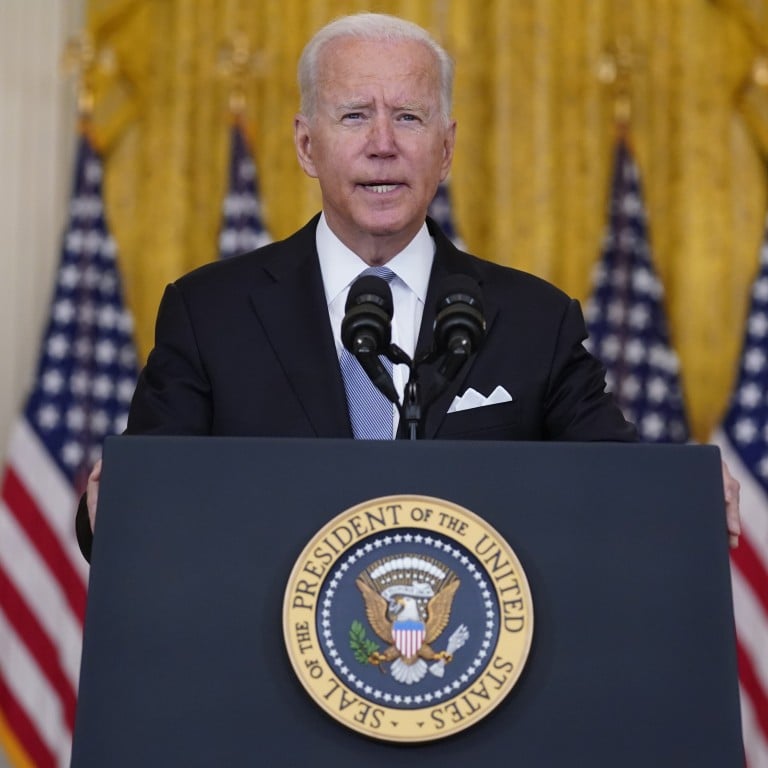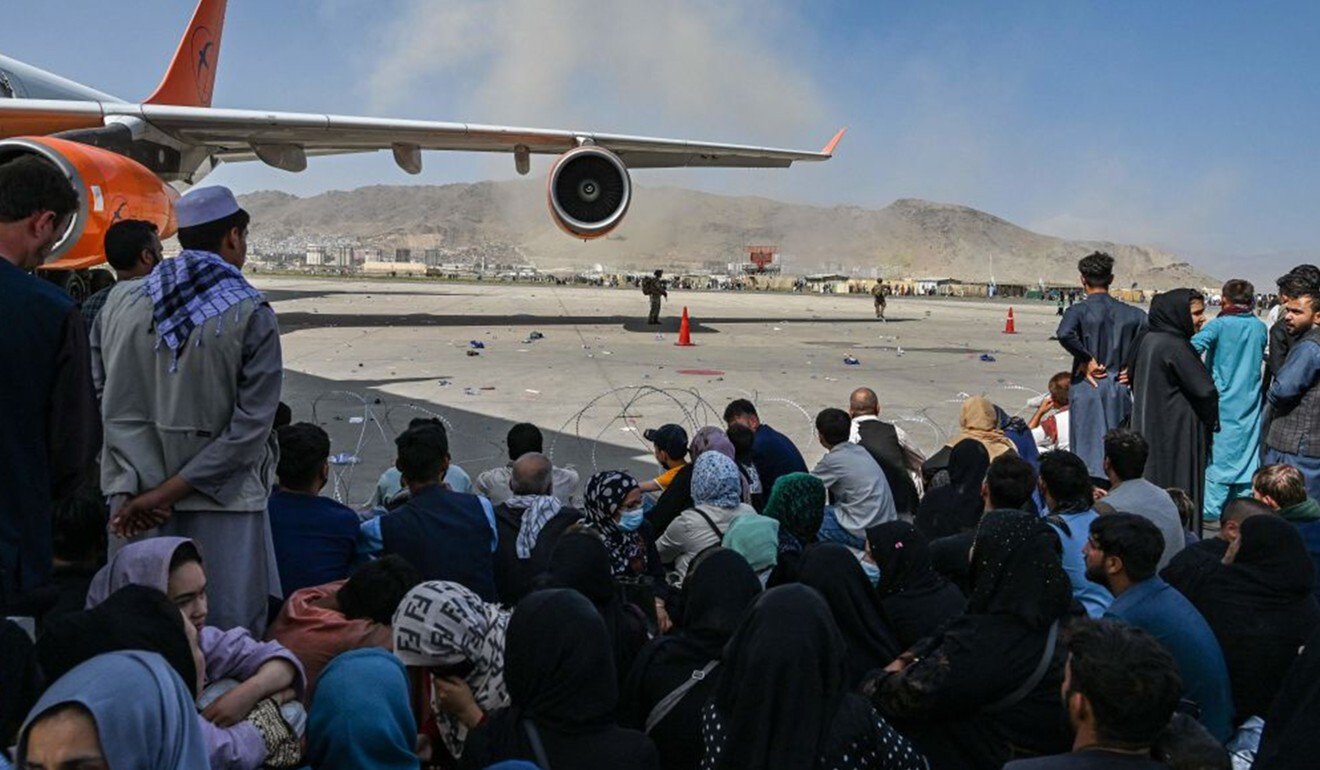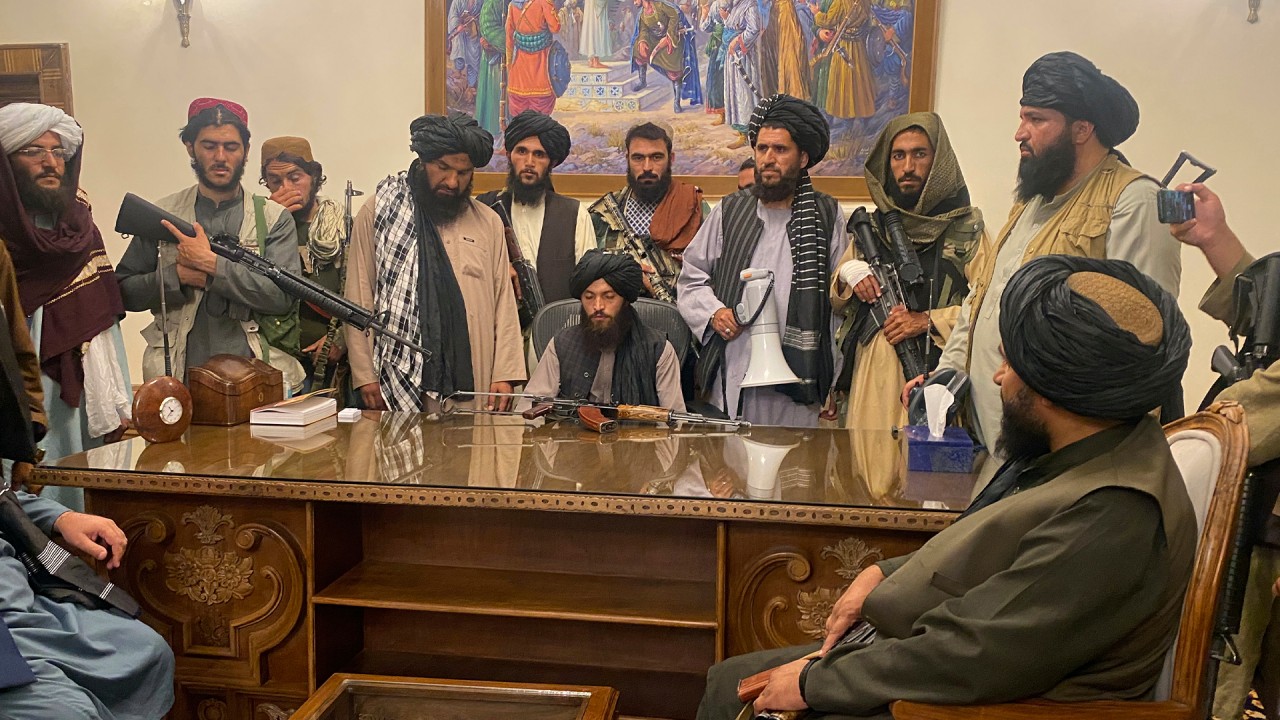
Joe Biden, in speech on Afghanistan’s rapid fall, defends his decision on US exit
- ‘After 20 years, I’ve learned the hard way that there was never a good time to withdraw US forces. I am president of the United States. The buck stops with me’
- US and Chinese diplomats speak about efforts to bring their citizens who remain in Afghanistan to safety
“I do not regret my decision,” Biden said in an address from the White House. “This is not in our national security interest. It is not what the Americans people want. It is not what our troops who have sacrificed so much over the past two decades deserve.”
“After 20 years, I’ve learned the hard way that there was never a good time to withdraw US forces,” he added.
Biden said the US embassy in Kabul has been closed, diplomats transferred to the airport and plans were in place to transport thousands of Americans out of the country.
“We’ve made it clear to the Taliban, if they attack our personnel or disrupt our operation, the US presence will be swift and the response will be swift and forceful. We’ll defend our people with devastating force if necessary.”
Biden noted that he is the fourth US president to preside over the war in Afghanistan, referring to it as the “graveyard of empires”, and said the US accomplished what it sought to do a decade ago: retaliate against the 9/11 attackers and ensure that the terrorist group al-Qaeda could not use it as a base for another attack.
“I know my decision will be criticised. But I would rather take all that criticism than pass this decision on to another president of the United States, yet another one, a fifth one,” he said. “I will not mislead the American people by claiming that just a little more time in Afghanistan will make all the difference.”
Biden also sought to defend the decision to hold off evacuating Afghans who have helped the Americans, saying that the Afghan government urged Washington to delay such a step to avoid a “crisis of confidence”.
But he said that the Afghan military lacked the will to fight and that the same messy ending could have happened five years ago or 15 years in the future. “The mission in Afghanistan was never supposed to be nation-building,” he said.

The rapidly deteriorating situation has led to a flurry of diplomatic activity and growing humanitarian concern.
On Monday, US Secretary of State Antony Blinken spoke with Chinese Foreign Minister Wang Yi. In a short statement, the State Department said topics included “the security situation and our respective efforts to bring US and PRC citizens to safety”.
A second, similar call was held with Russian Foreign Minister Sergey Lavrov, who said in a statement that Russia, China, Pakistan and the United Nations, among others, were discussing the creation of an inclusive inter-Afghan dialogue, according to Reuters.
By some accounts, meanwhile, up to 600,000 Afghans may be displaced, as the UN struggles to handle the unfolding humanitarian crisis. On Monday, the UN Security Council issued a statement calling for an end to hostilities, protection of human rights and a political settlement leading to national reconciliation.
‘Clearly botched’: Biden White House under assault on Afghanistan drawdown
“The international community should scale up humanitarian assistance to Afghanistan and its neighbours,” Chinese Ambassador Geng Shuang said at a UN Security Council briefing on Monday. “Afghanistan must never again become a heaven for terrorists. This is the bottom line that must be held firmly for any future political solution in Afghanistan.”
The seven-month-old Biden administration has stumbled as it sought to accomplish what two previous presidents tried unsuccessfully to do: end 20 years of conflict in Afghanistan and wind down America’s longest war. The cost in blood and treasure has been enormous, and is likely to rise.
But the speed of the Taliban’s victory – amid searing images of Afghans clinging to US military aircraft as they rose off the Kabul runway – has shocked the world and dented the administration’s global reputation.
Analysts said the administration had several options, none of which would eliminate the litany of bad headlines any time soon.

04:07
Taliban takes control of Afghan capital Kabul as President Ghani flees country
The first step is to address the immediate crisis by ensuring there are no captured US or Western citizens, in a bid to avoid a repeat of the 1979-1981 events in Iran.
“You must have a contingency plan to avoid the hostage nightmare at the Iran embassy,” said James Carafano, a vice-president of the Heritage Foundation. “You must exert as much command and control to get it off the headlines.”
China has sought to take advantage of the Biden administration’s stumbles by arguing that Taiwan cannot trust US pledges of support. But some in Washington questioned that premise and chalked it up to Communist Party spin in the tit-for-tat salvoes between the two powers.
The problem is not with Biden’s Afghan policy, it is with the execution of the withdrawal, some analysts said. Biden’s stated objective – to shift emphasis and resources from the region – will ultimately be appreciated by Taiwan and Asia, they said.
“In Taiwan, there will of course be some nervousness about the US commitment, that’s always the case,” said Zack Cooper, a fellow with the American Enterprise Institute. “But being engaged for two decades made it difficult to direct resources to East Asia. I think that balances against the immediate concerns over US competence and commitment.”
‘War is over’: key Afghanistan dates since 2001
The panicked departure from Kabul will also change the equation on counterterrorism intelligence. The US will need to strengthen its ties with central Asian states and India and apply pressure on Pakistan, which is often unreliable, to fill some of the vacuum, analysts said. It also will need to redouble anti-terrorism cooperation with allies and partners. “They have to get the band back together,” said Carafano.
Beijing and Washington are likely to have their differences over Afghanistan as events unfold, analysts said, given dissimilar national interests and perceived threats. But these differences are likely to be contained.
“For China, Afghanistan has a few opportunities and a lot of perils, and I’d expect China to pursue a policy with absolutely no illusions,” said Jon Alterman, Mideast director at the Centre for Strategic and International Studies, adding that he did not anticipate differences over Afghanistan to be a significant US-China irritant.
“Biden acted the way he did in part because he judged his foreign policy legacy won’t boil down to Afghanistan, and I think he’s probably right,” Alterman added. “The US global reputation is cumulative, and it doesn’t rest on any single decision.”
Additional reporting by Jacob Fromer in Washington

